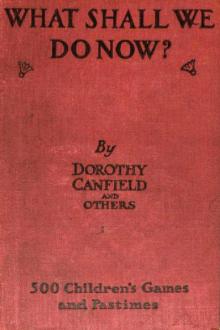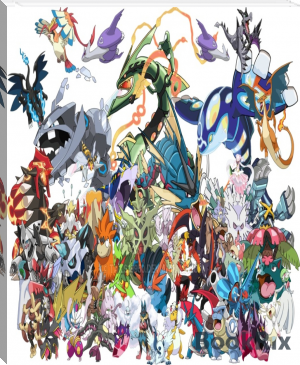What Shall We Do Now? by Dorothy Canfield Fisher (books on motivation .TXT) 📖

- Author: Dorothy Canfield Fisher
- Performer: -
Book online «What Shall We Do Now? by Dorothy Canfield Fisher (books on motivation .TXT) 📖». Author Dorothy Canfield Fisher
A customary arrangement to avoid taking the hiders too much by surprise is for the boy who stays at the base and counts a hundred to call out when he finishes
All that aren't ready call out 'I'!"
or simply
Look out for me!"
I Spy
"I Spy" combines "Hide and Seek" and "Tag." One player stays in the base, covers his eyes and counts a hundred, while the others run off and hide. On finishing the hundred the player shouts "Coming!" and runs out to look for the others. Directly he catches sight of one of them (and they are not hidden so carefully as in "Hide and Seek"), he calls out his name and the place where he has seen him; as, for instance, "Harry! behind the summer-house!" If there is no mistake and the name is right (it is very often wrong, in which case the player does not move), Harry has to run out and try and catch the other before he reaches the base.
Another way is for as many players to seek as to hide. In this case it is agreed beforehand as to how many of the seekers must be caught by the hiders for the game to be won. If the number is given at four and four are caught, the same side have the privilege of hiding again; but if only three or a smaller number, then the seekers have won and it is they who hide next time.
Chevy, or Prisoner's BaseThere is no better running game than this. You first pick sides and then mark off the two camps and take up your station there. The field is arranged thus:—
The game is opened by several of the A side running out to some point immediately in front of the two camps. When ready they call "Chevy." As many of the B side then start out to pursue them, each calling his particular quarry by name. The object of each A man is either to get back before the B man who is after him can catch him, or to tempt the B man into ground so near the A camp that he may be caught. In this aim he is helped by the fact that directly his B pursuer called his name and started out another A man probably called out the name of the B man and started to cut him off. No one is allowed to be pursued by two players at once.
If caught, the A man has to go to the place reserved for B's prisoners. Directly he gets there he calls "Rescue"; an A man will then call "Prisoner," and rush out to relieve him; while a B runner is all ready to intercept this A rescuer if he can.
The game is good both for runners who can keep it up a long time and for those who can make short, sharp dashes. The first named decoy the enemy out in pursuit, and the others hold themselves ready to dash across in front of the enemy's camp and cut off any one who is across the line. The rule as to shouting the name of the man you have marked down should be kept.
If there is more than one prisoner they stand just touching hands, in a line which reaches as far as possible toward their own camp, so that the distance between the first prisoner and the rescuer may be shortened. Each new prisoner takes up his place at the back of this line, farthest from the camp. A prisoner is rescued by being touched.
If one side is much weaker than the other a time comes when it is nearly all taken prisoner, with none to rescue except by leaving the camp undefended. Directly a camp is left undefended one of the enemy steps in and "crowns" it and claims the game. More often than not, however, a game of "Chevy" is left undecided. It does not matter in the least, for in this game the fun is more in playing than in winning.
French and EnglishFor this game the ground must be divided by a path or line into two territories—French and English. At the further side of each territory a number of flags—handkerchiefs will do—must be placed at intervals. The players are then divided into the two nations, and the game consists in each side trying to get the flags from the other side, to guard its own, and to catch the enemy when he is off his own ground. Once a player sets foot upon the enemy's territory he must go on, but he cannot be caught if he has a flag in his hands. If he is caught he becomes a prisoner (as in Chevy), and is only released by being touched by one of his own party. A player cannot redeem a prisoner and take a flag at the same time. The game ends when all the flags of one side have been taken.
Black ManThis is rather rough. A line is drawn at each end of the playing place and one player is told off to stand between these lines. The object of the others is to run across, from base to base, without being caught by him: being caught meaning not merely being touched, as in "It," but being really held and stopped. Each one that is caught has to stay in the middle to help catch the others, until no one is left to run across at all.
The player in the middle calls out to the crowd of players, "What'll you do when the black man comes?" and they answer,
And never mind you."
This is the signal to begin each rush across from one line to the other.
Stagarino"Stagarino" is similar to "Black Man," except that all the players who are caught, and whose business it is to catch the others, join hands. Those that run across have therefore to avoid them or to try and break through the wall of arms.
Red Rover"Red Rover" is also similar to "Black Man," except that instead of all running at the same time, the "Rover" calls out:—
Let (mentioning name) come over!"
at which the one named has to run from one base to the other. If he is caught, he must assist the "Rover" in catching the others.
Hop, Step, and JumpThis is a change from ordinary racing. The competitors, instead of running against each other, see which can cover the most distance in a hop, a step, and a jump, or, say, three hops, three steps, and three jumps. It needs an umpire to watch very carefully that the step begins exactly where the hop left off and the jump where the step finished.
Follow-My-LeaderThis needs no explaining. It is nearly always good fun for a while, and particularly so if the leader has original ideas.
OUT FOR A WALK OUT FOR A WALKOn country walks, where there is much to see, one should not be in need of ways to make the time seem shorter. And new walks in the town, or walks where there are interesting shop-windows, are not dull. But the same walks again and again can be very tiring; and it is to help these that the methods which follow have been collected.
A good walking pastime for two is for one to drive the other. Hoops are a great help (see p. 169) and so are dolls' perambulators. But on many walks nothing of this kind is allowed, and one has to fall back on conversation. Telling stories in turns, or making up stories about passers-by, is useful, but it is not every one that is able to do this.
Roadside WhistIn the Channel Islands visitors riding about in large wagonettes pass the time by playing a game called "Roadside Whist." The people on the left seat of the carriage take the right side of the road, and those on the right seat take the left. The conductor teaches them the rules at the beginning of the drive. In our case it is better perhaps to make them for ourselves, to suit our own particular country. Let us suppose that—
If you see
A baby in arms you score 1 A baby in a perambulator " 3 A white horse " 5 A ladder against a house " 2 A woman in a white apron " 1 A butcher's cart " 1 A street gate " 2 A postman " 5Then there should be a few things for which marks have to be taken off. Let us suppose that—
If you see
A pug dog you lose 2 A piebald horse " 4 An open gate " 2 A flock of sheep " 3 A soldier " 10No matter what the score is, whichever side sees a cat on a window-ledge wins the game.
Counting DogsIn a town there are other varieties of roadside whist for two players or sides. Counting dogs is one. In this game one takes all the streets leading from the left, the other all from the right.
Guessing Horses' TailsA good game (writes E. R.) while out for a walk is "when you see a horse coming, guess what color his tail is before he can reach you, and then, whoever guesses right, the horse belongs to him."
Shop-WindowsExcept in very dull streets shop-windows can be always entertaining. It is interesting to suppose you have so much money—say five dollars—to spend, or, if you like, an unlimited sum, and choose what you would buy as you pass each shop, E. H. writes:—"One little girl used to suppose that she was the eldest of a large family whom she had to provide for, and was always on the lookout for things in the shops that would do for her younger brothers and sisters. For instance, if she decided that the family must have new winter clothes, she would first make up her mind how much she could afford and then price the things in the shop-windows. Sometimes she would set her heart on a particular cloak for the baby, but could not pretend to buy it till she had seen whether it would leave her enough money for the other children. If she could get all the children dressed fairly nicely for the sum at her disposal she had all the satisfaction of a successful day's shopping. Sometimes the clothes she wanted were too dear, and then she had to decide what was most necessary, what she could make at home, and so on."
Making SentencesIt is rather exciting for each player to take a side of the road where there are shops and see which can first complete a given sentence or word from the initial letters of the shopkeepers' names, Christian or surname. In fixing upon a sentence it is well to be careful not to have unusual letters, such as Q, or U, or J in it. If this is too difficult all the letters in the shopkeepers' names may be taken, or those in every other name.
Collecting Jones'sIn Mrs. Meynell's book, The Children, one little girl on her walks collected Jones's—that is, shops with the name of Jones over them. If any one else cared for this amusement





Comments (0)